How to Carry Out the Ultimate Skincare Routine, According to a Dermatologist
Building the perfect skincare routine (if that even exists) can seem like a mammoth task, but really, all it takes is understanding what products you need and what order to apply them in. To give us the full breakdown, I've enlisted the help of dermatologist Sonia Khorana—but first, let's cover the basics.
If you're wondering why you even need a skincare routine in the first place, Khorana explains that there are a number of reasons. "Firstly, your skin is your first line of defence from environmental pollutants," she says. "And secondly, protecting and looking after your skin can help prevent damage to its skin barrier." For context, environmental pollutants are a main cause of skin ageing, and the skin barrier is responsible for keeping bacteria and pollutants out. "It's important to have healthy skincare habits in your twenties and thirties, as this can strengthen and prepare your skin for those effects of ageing," she adds. "Skin conditions can manifest and worsen if you don’t look after your skin, and on a separate note, skincare helps carve out time for self care."
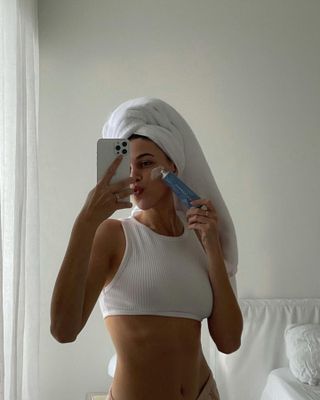
Now if you are totally new to skincare, don't worry, we're not about to prescribe you a 20-step routine. "To get the most benefit out of a regular skincare regimen, you only need to follow a few simple steps—cleanse, moisturise and protect," explains Khorana. "Sticking to this simple, stripped-back routine can help keep your skin healthy and happy."
"You can build on this routine and add a step we call 'treat' to address any skin concerns with ingredients like vitamin C, retinol, AHAs, BHAs," she adds. This step can be incorporated via products such as face mists, serums, toners, and oils, and will help you to address specific skin concerns, such as breakouts, dryness, sensitivity, scarring, redness, and signs of ageing.
To get to grips with what a perfect skincare routine might look like and to understand which steps really are the essentials, scroll down for our ultimate guide to building a daily skincare regimen. It's also worth mentioning that what works for you might not work for me, as everyone's skin and needs are different. So with that in mind, feel free to use this as a guide to finding your perfect skincare routine, as opposed to hard and fast rules. Enjoy!
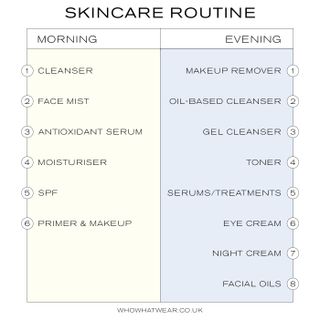
Save this, make it your background, send it to your friends... this is your guide!
Morning Skincare Routine:
1. Cleanser
The first step in your morning skincare routine? A good cleanse—and don't be tempted to skip it. "Cleansing in the morning helps you to start your day with a clean slate," explains Khorana. "If you don’t do it, this could cause build-up of oil and dirt that may make you more prone to fungal or bacterial overgrowth, more prominent pores, and sometimes even inflammation."
When it comes to choosing the best cleanser for your skin, Khorana advises keeping your skin type front of mind. "If you have dry skin, look for ingredients like ceramides, hyaluronic acid, niacinamide, squalane, glycerin and panthenol," she recommends. "For oily or acne-prone skin look for gel or foaming cleansers that contain BHAs like salicylic acid. AHAs can also be a good addition if your skin is sensitive but oily—look for lactic acid or mandelic acid."
Shop the hero product:
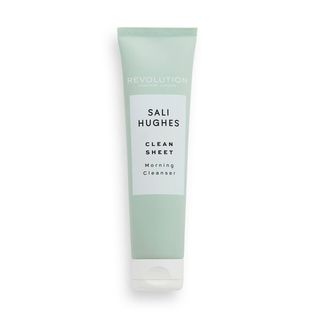
Not yet sure what your skin type is? This cleanser is a great option as a morning cleanse for all skin types. It leaves your face clean and refreshed, but feeling comfortable and balanced.
2. Face Mist
A face mist is by no means an essential step, but it can be a great way to refresh skin post-cleanse and to add hydration in before you apply a face cream. According to Khorana this is a great way to layer in moisture before trapping it in with your moisturiser.
Shop the hero product:
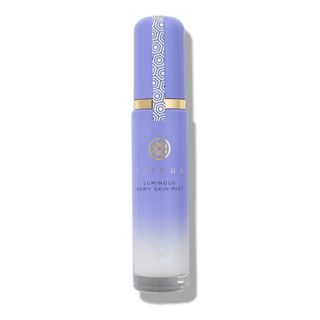
This refreshing mist delivers a fine mist of moisture—so it can even be applied over makeup.
3. Antioxidant Serum
This step is where you have an opportunity to tweak and personalise your skincare routine to suit your specific skin type and any concerns. "Irrespective of your age, skin type or concern, serums are a great addition to your skincare routine," says Khorana. "There are lots of different types on the market and they can help hydrate, brighten and address pigmentation and ageing."
"Serums can contain a range of useful ingredients and are designed to deliver high and specific concentrations of active ingredients to the skin," she adds. "During the daytime, look for antioxidant serums. These help to protect your skin from free radicals and the pollution you're exposed to on a daily basis. They’re useful in preventing fine lines and other visible signs of ageing, and can heal and repair skin." Vitamin C and niacinamide are two popular antioxidant ingredients which are commonly found in serums designed for morning use.
Shop the hero product:
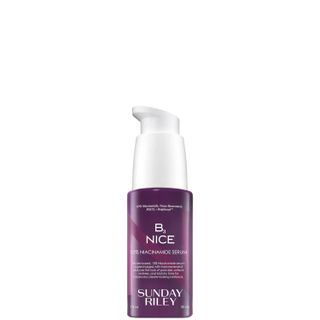
Niacinamide is a great multitasking ingredient which has benefits for all skin types—it can help to reduce pore size, improve skin's hydration levels, fade post-acne pigmentation and reduce redness. This potent 10% blend gets particularly impressive results for skin prone to oiliness, dark spots, redness and enlarged pores.
4. Moisturiser
No matter your skin type, moisturiser is another skincare routine essential. "Even if you have oily or combination skin, it’s still important to moisturise," says Khorana. "You can tailor the texture and thickness to suit you." For example, if you have oily skin you'll probably prefer to use a lightweight moisturiser with a gel texture, whereas dry skin types will need something thicker and richer.
"Moisturisers help with all skin types for a pretty simple reason, they supply hydration to the skin and form a protective barrier that holds it in," adds Khorana. "Moisturising keeps your skin soft and hydrated which helps maintain balanced, healthy skin cell turnover."
Shop the hero product:
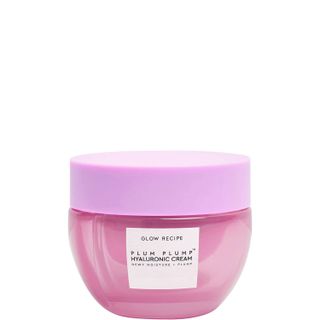
Hyaluronic acid is a key ingredient found in most moisturiser and beneficial for all skin types. It works by drawing moisture into the skin, resulting in a softer, plumper, healthier-looking complexion.
5. SPF
Alongside a cleanser and moisturiser, sunscreen is one of the three basic essentials that Khorana advises always having in your skincare routine. "It is essential to protect your skin from the sun all year round, but especially during summer, so this key step should never be neglected," she explains. "UV rays from the sun don’t just cause skin cancer but are also the biggest factor in our skin’s ageing. I always recommend daily sunscreen use all year round to my patients to help protect against skin cancer, treat uneven pigmentation, and for its anti-ageing benefits."
It's important that this step is the final one in your morning skincare routine. "This is to make sure that the sunscreen is in an even layer and to make sure no skincare ingredients interfere with its protection," Khorana explains. "I’d recommend using two finger strips of sunscreen (or half a teaspoon) for your face and neck."
Shop the hero product:
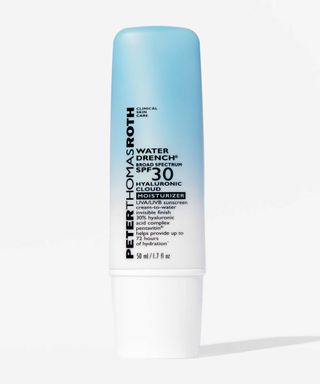
Unlike old-school sunscreens which tended to leave skin greasy, chalky, and with a white cast, the latest SPF launches deliver protection via lightweight, hydrating formulas. This ultra-hydrating formula feels weightless and refreshing, and doesn't leave a hint of residue—no matter how much you apply.
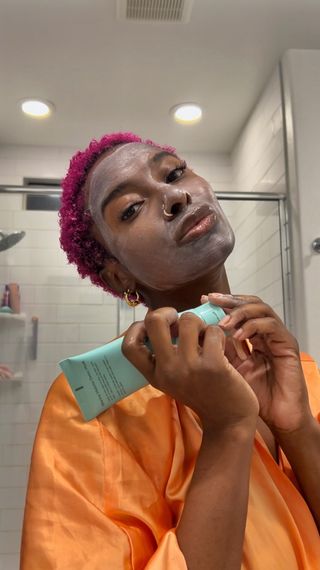
Evening Skincare Routine:
1. Makeup Remover
If you wear makeup then it's a good idea to remove as much as you can with a makeup remover before you begin your proper cleanse. Look out for formulas that utilise micelle technology—micelles trap and dissolve oil, makeup and dirt, without stripping skin.
Shop the hero product:
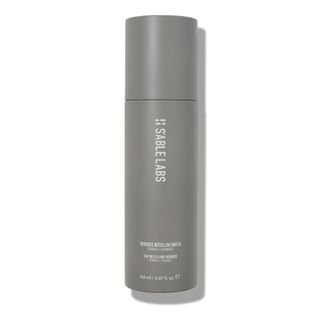
This fragrance-free micellar water is suitable for even the most sensitive skin, helping to quickly and efficiently remove makeup—no scrubbing required.
2. Oil-Based Cleanser
"Washing your face before bed is recommended, to not only remove makeup, but also the dirt and pollution that accumulates on your skin during the day," advises Khorana. "These particles can cause oxidative damage which can contribute to premature ageing." An oil-based cleanser like a balm or oil will help to break down stubborn makeup and dirt, but does so in a way that doesn't leave skin feeling tight or stripped.
Shop the hero product:
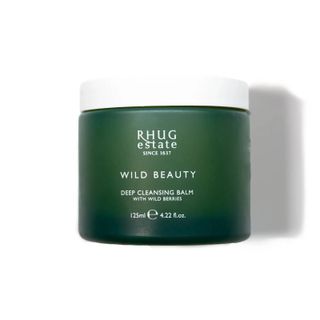
This cleansing balm has a dense jelly texture which feels incredibly luxurious, but also doesn't leave any oily residue on skin.
3. Gel Cleanser
You might not need a second cleanse, but if you've been wearing a lot of makeup or your skin is typically quite oily, it can be a good idea to incorporate one into your routine. "If you have oily skin or are acne-prone, you may also get more clogged pores and breakouts if you are not washing your face properly," says Khorana, who recommends using gel textures and foaming washes for this step.
Shop the hero product:
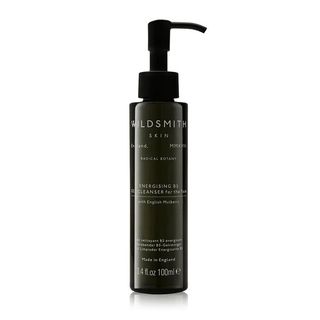
This refreshing gel cleanser works to remove deep-rooted impurities and stubborn makeup, targeting enlarged pores, dull skin and breakouts.
4. Toner
Again, toner isn't necessarily a must-have step, but it can be a good way to incorporate some more beneficial ingredients into your routine—even if only used once or twice a week. Some toners work by exfoliating the skin, which can help with uneven tone, texture, dullness, and the appearance of pores and dark spots; while others serve to pack more moisture into skin.
Shop the hero product:
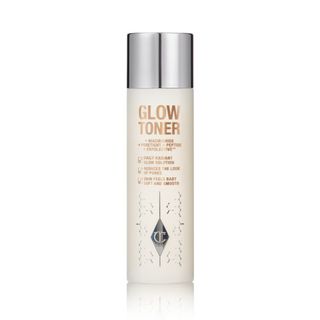
This creamy toner draws upon the benefits of niacinamide and peptides to brighten and hydrate skin without the need for exfoliation.
5. Serum
When it comes to choosing a nighttime serum, Khorana advises using a retinoid. "It is a skin superhero and can help with rebuilding collagen, fading hyperpigmentation, textural irregularities and oil control," she explains. "They're great for ageing concerns, like fine lines and wrinkles."
Retinoids can also be beneficial for those who have acne-prone skin or are dealing with post-acne hyperpigmentation, but if those aren't issues you're concerned about, there are plenty of other options to choose from. "Sometimes choosing a morning and evening serum can be a bit overwhelming if you’re new to skincare," says Khorana, who recommends looking for one that addresses a variety of issues if you don't want to use a retinoid. "These kinds of serums usually contain hydrating and skin-building ingredients that all skin types can benefit from, and you can use this twice a day."
Shop the hero product:
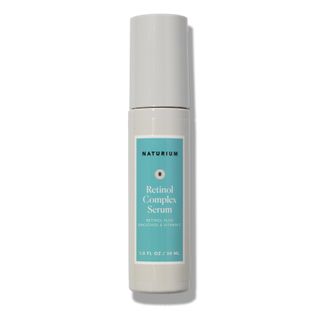
If you've never used a retinoid before but fancy giving the hero ingredient a go, this is a great beginner-friendly and affordable option.
6. Eye Cream
If you don't have any eye area-related concerns and you'd rather keep your skincare routine minimal then skip this step, because according to Khorana it's not essential. "Many facial moisturisers are perfectly fine to use around your eyes," she adds. "But sometimes it’s handy to have a gentler or targeted eye product (depending on your needs), especially if you’re using many active ingredients in your skincare routine."
If you are looking to treat a specific concern in your eye area, for example dark circles, Khorana recommends looking for formulas that contain tried-and-tested ingredients like retinoids, vitamin C, kojic acid, liquorice root extract, niacinamide and azelaic acid.
Shop the hero product:
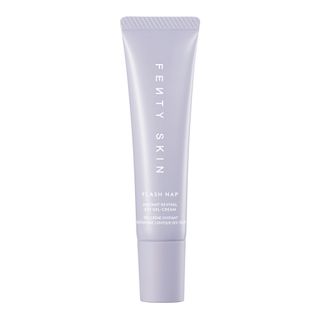
This nourishing gel-cream formula is perfect for soothing tired eyes and nourishing dryness.
7. Night Cream
Since active ingredients like retinoids can often irritate and dry out the skin, Khorana advises using a moisturiser alongside actives to increase the water-holding capacity of your skin. "They form a layer to trap in the moisture, which prevents dryness and irritation," she adds.
You might be wondering why you need to bother moisturising in the evening if you already moisturised in the morning. "It all comes down to the stratum corneum, the outer layer of skin," explains Khorana. "The stratum corneum protects your skin from irritants and inflammation, and it also helps keep the deeper layers of skin hydrated—it is often referred to as the skin barrier." Since things like cleansing, exfoliating, using actives, and being exposed to harsh environments can impact the skin barrier, this is why it's important to moisturise in the evening, too. "The stratum corneum is already made up of lots of different components, including fatty acids and ceramides, but supplementing your skin with moisturisers that contain these ingredients will ensure that your skin will be at its happiest and healthiest, even whilst using actives," she adds.
Shop the hero product:
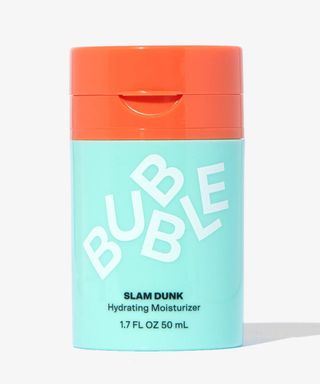
This thick and nourishing moisturiser is packed with humectants (ingredients that absorb and retain water), so it's a great option for evening use.
8. Facial Oil
Not everyone needs to use a facial oil, but dry skin types, or those experiencing dryness from active ingredients like retinoids, can certainly benefit from this step. There's some debate about whether an oil should be applied before or after moisturiser, but according to Khorana, it's best as the final step in your evening skincare routine. "Apply products with highest water content first and follow up with products with less water content or a higher oil content," she advises. "This is basically because products with higher water content will help hydrate the skin, but if you occlude it with a thicker or higher oil content product first, water may not be able to penetrate as well."
This basically means you can trap the moisture from your previously applied products under the oil."It isn’t the end of the world if you layer wrong, but you probably won’t get the most out of your skincare if you end up using an occlusive product first, Khorana adds.
Shop the hero product:
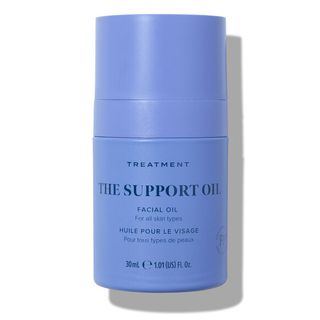
Specifically formulated to be used alongside retinoids, this oil helps to soothe and nourish skin in order to counteract dryness and irritation.
This story was published at an earlier time and has since been updated.
Next Up: 27 Affordable Skincare Products That Will Tighten, Firm and Smooth Mature Skin
Grace Day is a beauty editor and content creator. She has over 10 years of beauty-industry experience, spanning editorial, retail, and e-commerce, which gives her a unique understanding into how people shop for their beauty routines.
While studying for a history degree (specialising in the history of beauty) and working as a beauty adviser in department stores, Grace started writing her own beauty blog in order to share the products she discovered while dealing with acne. After graduating, she moved to Beauty Bay as beauty editor and content manager. Grace is currently a beauty contributor to Who What Wear. She has also written for Hypebae and PopSugar and works as a brand consultant and copywriter.